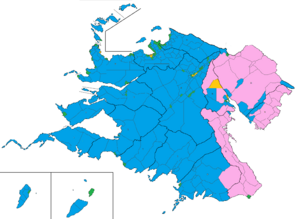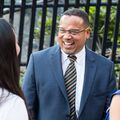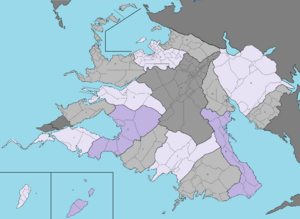2004 Zamastan presidential election
| |||||||||||||||||||||||||||||||||
359 Majority votes needed to win | |||||||||||||||||||||||||||||||||
|---|---|---|---|---|---|---|---|---|---|---|---|---|---|---|---|---|---|---|---|---|---|---|---|---|---|---|---|---|---|---|---|---|---|
| Registered | 277,822,000 | ||||||||||||||||||||||||||||||||
| |||||||||||||||||||||||||||||||||
 | |||||||||||||||||||||||||||||||||
The 2004 Zamastan presidential election, held on Wednesday, 22 September 2004, was the upper ring of the 2004 Zamastan general election, and was the 99th general election and the 102nd presidential election. Voters elected former-president Cassious Castovia (BCP). Incumbent-president Camren Ellison was seeking reelection and disputed the GLP's attempts to replace him on the ticket, despite unpopularity driven by the ongoing war in Vulkaria. Castovia, who had previously served as president from 1982 until 1986 and intervened in Vulkaria during his first term, won in a landslide victory on the promise to end the war.
Background
Eligibility
The Constitution of Zamastan gives the qualifications for holding the presidency. To serve as President, one must:
- be a natural-born citizen of Zamastan
- be at least 18 years old
- have not been convicted of a felony
- have not served any political office in any other nation/sovereign land aside Zamastan
- have not been impeached from any political office
- have not sworn a pledge to the state of Zamastan and subsequently rebelled against the state
Campaigns and nominations
The modern presidential campaign begins before the primary elections, which the five major political parties use to clear the field of candidates before their national nominating conventions, where the most successful candidate is made the party's nominee for president. Several nominees, however, have chosen to run aside from political parties. This choice generally makes running for office more difficult for getting exposure, as the political parties' prominence allows for wider name-recognition. This is why most independent nominees tend to be celebrities or household names.
Nominees participate in nationally televised debates. Nominees campaign across the country to explain their views, convince voters and solicit contributions. Much of the modern electoral process is concerned with winning swing states through frequent visits and mass media advertising drives.
Election
The president is elected indirectly by the voters of each district through popular election on Election Day (September 22nd on every even-ended year). When each of the 359 districts counts the ballots, whichever candidate has the most votes receives that district's vote. The winner of the election is which ever has the majority of the 359.
Voting polls open at 11:59 PM on September 21st and last 17 hours until 5:00 PM on September 22nd. The counting of votes closes around 7:00 PM, which is also when the victor is announced.
Nominations and Candidates
| Name | Born | Experience | Campaign Announcement Date | ||
| Name | Born | Experience | Campaign Announcement Date | ||
| Name | Born | Experience | Campaign Announcement Date | ||
Other candidates
| Name | Born | Experience | Campaign Announcement Date | ||
| Name | Born | Experience | Campaign Announcement Date | ||




